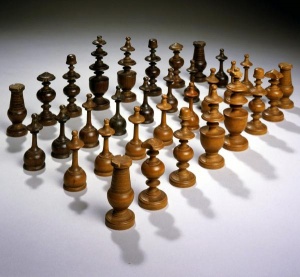 |
| Ben Franklin's Chess Set |
Chess
Chess, for instance, was considered exceptionally boring. Charles Cotton, author of The Complete Gamester (1674) found it tedious and “more difficult to be understood than any other game whatever.”
Due to its length and reliance on skill rather than chance, it also makes a very poor gambling game, which certainly added to its unpopularity. There were surely a number of chess sets in America in the 18th century, but oddly enough only a few survived, including two owned by Thomas Jefferson and one by Ben Franklin.
Franklin almost certainly was the man who brought Chess to America. He was playing by 1733, and wrote an important essay on the game. His efforts to popularize it didn’t spread far beyond members of the Franklin's American Philosophical Society, however.
Checkers (Draughts)
Although it was also known to the colonists, Checkers was as unpopular as Chess. The rules in use would have been similar to English Draughts. These are the same rules we use today in Checkers, rather than the rules for Spanish or French Draughts, or other variations.
Whatever they called it, it wasn’t nearly as popular as it was to become later.
The game does show up in Virginia court records, however. In 1679, Mr. John Edwards and a servant were arrested and put before the grand jury because they played Checkers on a Sunday.
Backgammon
Backgammon had a bit of a following in the Colonies for a simple reason: it used dice, which promised chance, which meant it was a good game for betting. Many Backgammon tables appear in Colonial inventories, and Backgammon games (and monetary losses) are mentioned in many diaries of the period. Thomas Jefferson played, and would win or lose several shillings in a session.
In Colonial Virginians at Play, Jane Carson describes the variants used at the time:
In the French versions, tric-trac or tick-trac, all the men started from the ace-point and penalties were different. Sice-ace was a modification for five players, each using six men. In dubblets the fifteen men used were placed differently on the tables, and in ketch-dolt all the men were piled in the center of the board.
Dominos
Although very popular in France, Dominos didn’t make any impression in America until the 19th century. In 1801, it was still considered a “childish sport” by one writer of the time, who also noted that it “could have nothing but the novelty to recommend it to the notice of grown person in this country.”

0 comments:
Post a Comment
All ad-driven comments will be marked as spam and deleted.
Note: Only a member of this blog may post a comment.